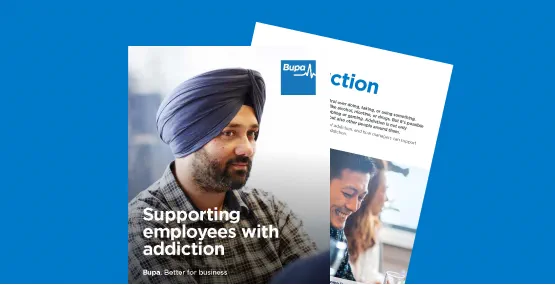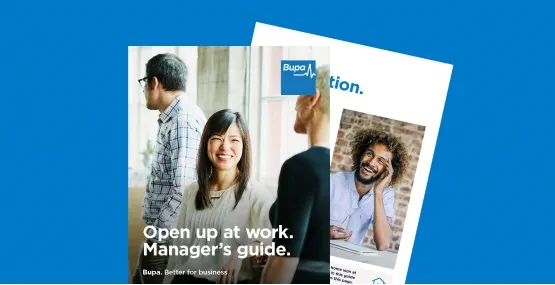How to provide support for staff struggling with addictive behaviours
For an employee who is struggling with addiction, effective support can be life-changing. It can also ensure the safety and wellbeing of the teams they work with. But what does this look like?
It depends. Different forms of addiction present their own challenges and risks. There is no simple off-the-shelf solution.

Dr Sarah Griffiths, Lead Behavioural Insights Specialist, Bupa Global and UK says,
“Misuse of substances and drugs can have an impact on the employee's physical and mental health. In some work contexts, this could pose a safety risk.' “A gambling disorder can lead to impulsive decision making and financial harm, such as over borrowing and large debts.”
Support strategies
Each case will present its own challenges, but it is essential to have clear policies and support in place. There are some key pillars and issues to consider:
Training and awareness
Company policies should be clear, consistent and communicated as part of the induction process.
Any alcohol or drugs policy should focus on protecting team members. It should encourage employees to speak to their line-manager or a trusted colleague if they are struggling.
Think about grey areas. For instance, is alcohol banned from all work environments? Or are exceptions made for personal or business celebrations?
Social drinking may be part of many workplace cultures. But where do you draw the line between social drinking and an employee who consistently drinks heavily? These social situations could also draw attention to colleagues who regularly drink heavily.
Is there an unwind culture or element of corporate hospitality where heavy drinking, or drug-taking, are seen as part of the job? Or slip under the radar?
The Health and Safety Executive advice is to ensure line-managers and team leaders have clear guidance on:1
How to recognise the signs of alcohol or drug use
Your organisation's rules around alcohol and drug use
What to do if they suspect an employee has a problem
What to do when an employee, or colleague of an employee, raises concerns
If you suspect a problem:
- Speak to the employee in private
- Use open, non-judgemental questions to start the conversation. For example, ‘You’ve looked very tired over the last few days. How are you feeling?’ Or ‘You haven’t seemed quite yourself recently, is there anything I can help with?’
- Stress that the intention is to provide support, not judgement. Use terms like ‘problem with alcohol’ rather than ‘alcoholic’ or ‘alcoholism’. And avoid terms such as addict and addiction.
- Outline any Employee Assistance Programmes or other sources of support. And provide a phone number or web address to remove barriers, or offer to make contact on their behalf.
Trust and relationships:
Line-managers who have built good team relationships are more likely to spot signs that an employee is struggling.
This may include:
changes in behaviour
mood swings
increased absence
missing deadlines or a decline in performance
These changes could be caused by a number of issues. But whatever the cause, it's well worth a conversation to check-in.
Substance misuse can also impact relationships with other employees who may be trying to cover for a colleague. They may face an increased workload as a result of their colleagues absence or impaired performance.
Treating alcohol or drug dependence as an illness, and framing policies around rehabilitation may encourage team members to seek help.
Dr Griffiths adds,
“It is also important to remember that dependence on drugs or alcohol are recognised medical conditions and therefore, need to be treated in the right way.
“Employees should have confidence that their problems will be addressed confidentially where possible, and advised if employers are under an obligation to notify external agencies. They should also be confident their issues will be dealt with effectively and consistently.”
As the Chartered Institute of Personnel and Development report points out, “It’s vital that employers create an environment where people feel able to ask for help and confident that they will be supported to get the help they need.”2
Signposting support:
Addictions and poor mental health often go hand-in-hand. As a result, programmes that build psychological wellbeing can help identify any underlying drivers for the addictive behaviour.
Helpful steps on a pathway to recovery may include:
Cognitive Behaviour Therapy (CBT)
Treatment for depression
Support for issues such as sleep disruption
For large organisations, buddy systems can also help. This is when people who are struggling with addictive behaviours or substance misuse are buddied with someone in recovery.
Employees should also be encouraged to ask their GP for help, or for a referral to a specialist drug or alcohol service.
Dr Griffiths concludes,
"Substance misuse can often trigger or exacerbate physical health problems which will require treatment."
"For instance, alcohol not only causes liver damage, it can also lead to raised blood pressure and cholesterol. This increases the risk of heart disease and strokes. It also undermines the immune system and increases the risk of a number of cancers.3"
Useful links:
- Drug and alcohol misuse at work: Guidance for people professionals (CIPD)
- Alcohol Change UK
- Alcoholics Anonymous helpline on 0800 9177 650
- Al-Anon Family Groups helpline on 0800 0086 811
- Search for local NHS drug and alcohol services.
- DrugWise
- FRANK
- Cocaine Anonymous UK
Resources from the Workplace Health and Wellbeing Academy

Managers guide: Addiction

Managers guide: Mental health in the workplace
1 Health and Safety Executive, Managing drug and alcohol misuse at work.
2 Championing work and better work lives (PDF, 2.7MB) , Managing drug and alcohol misuse at work, August 2020.
3 GOV UK, Alcohol misuse, October 2022. Dementia care


